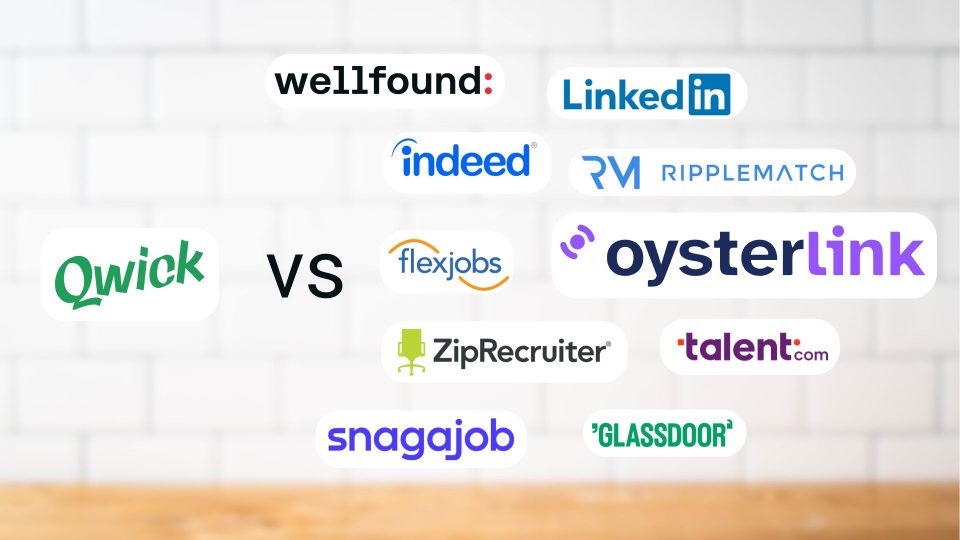Since Qwick launched in 2017, the platform has helped many employers in the restaurant and hospitality industries solve their staffing issues and save time.
For job seekers, Qwick provides an immediate source of income while giving them time flexibility.
However, you don’t have to rely solely on Qwick to access these benefits. Qwick alternatives offer more, such as lower prices, a broader talent pool and a better user experience.
That being said, let’s review the 10 best job search platforms like Qwick below.
Qwick Alternatives
| Platform | Prices | Focused on hospitality? | Has resources for training and development? |
|---|---|---|---|
| Qwick | 40% of staff hourly pay | Yes | No |
| OysterLink | Free | Yes | Yes |
| Flexjobs | $2,999 per year | No | Yes |
| Snagajob | $89 per job per month | No | Yes |
| RippleMatch | $30,000 per year | No | Yes |
| Talent.com | Free posting/paid boost visibility | No | No |
| Glassdoor | Free posting/paid boost visibility | No | Yes |
| Indeed | Free posting/paid boost visibility | No | Yes |
| One free job post at a time | No | Yes | |
| ZipRecruiter | $24 / post per day | No | Yes |
| Wellfound | Free / paid subscription plan at $149 | No | Yes |
What is Qwick?
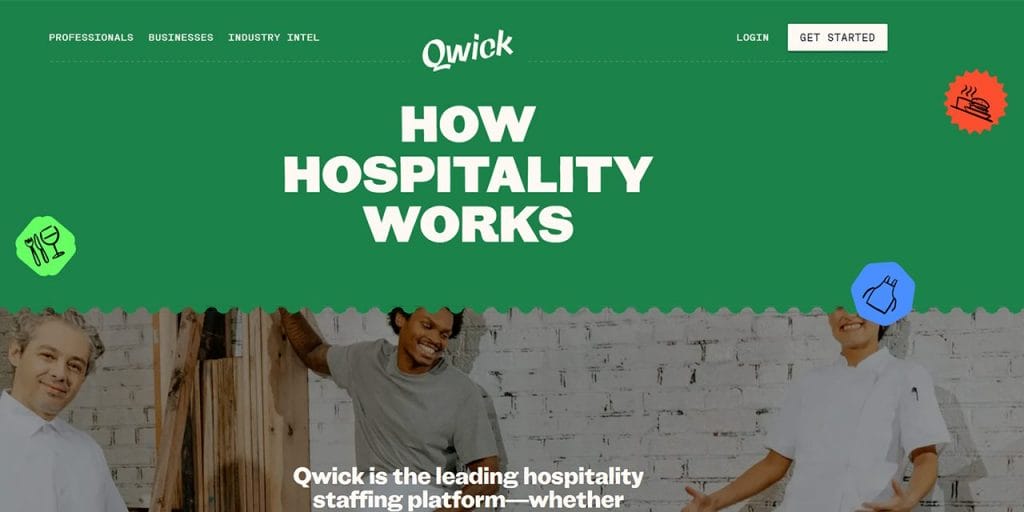
Qwick is a hospitality staffing platform that helps employers find pre-screened temporary workers to fill last-minute shifts or manage peak times.
Although they offer the option to hire staff for full-time positions, Qwick primarily focuses on shift workers, so it may not be the best option for applicants seeking employee benefits and career advancement.
In addition, using Qwick comes with a significant cost. It charges 40% markup on top of the freelancer’s hourly pay. This means that if a Waiter’s hourly rate is $15, and the employer needs them to work for four hours, the total cost would amount to $84.
What are some alternatives to Qwick?
We’ve collected and compared 10 job search platforms, analyzing prices, the availability of resources for training and development and whether it’s focused on the hospitality industry.
1. OysterLink
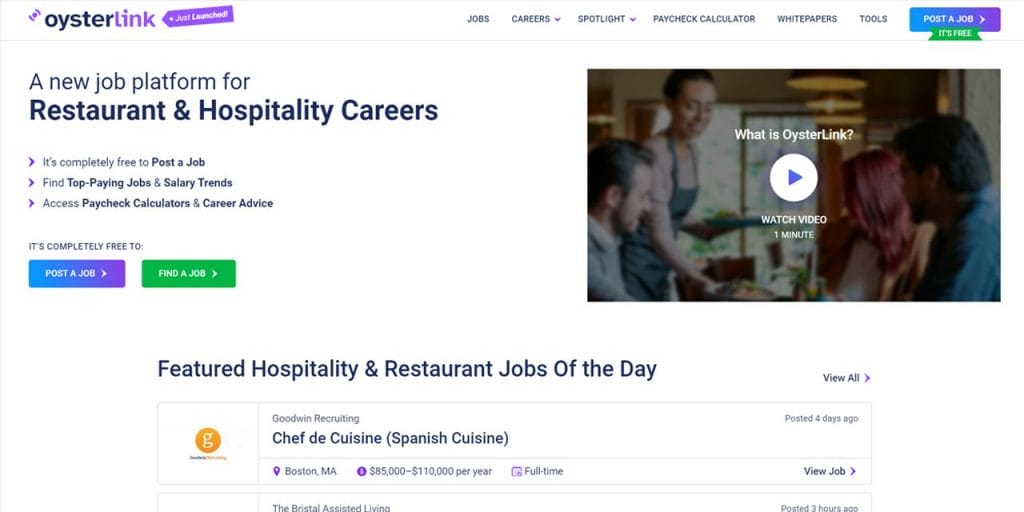
OysterLink is the newest player in the job search platform field. Launched in 2024, it helps employers in the restaurant and hospitality industry find candidates without unnecessary hassles.
OysterLink job posting cost:
Employers can post a job and access more than 150,000 restaurant and hospitality professionals for free.
Why it’s great for employers:
OysterLink is dedicated to helping employers by providing tools and data needed to attract, hire and retain the best candidates, including downloadable job description templates, interview guides and industry whitepapers.
The platform is easy to use, allowing them to advertise jobs with just one click, saving valuable time.
Why it’s useful for job seekers:
Similar to employers, OysterLink offers extensive resources to help job seekers land the jobs they want and thrive, such as career advice from industry leaders, resume templates and salary guides.
In addition, OysterLink has a Paycheck Calculator to help them estimate their take-home pay. By knowing their net income, they’ll be able to manage their finances better.
Pros
- Free
- Intuitive and user-friendly website
- Focuses on tourism, restaurant and hospitality locations, including New York City and Miami
- Offers a wide selection of job listings from the events, food and beverage and hotel industries
- Provides a vast library of resources
- Works for both part-time and full-time job seekers
Cons
- New in the field
- Smaller user community compared to other general job boards
2. Flexjobs
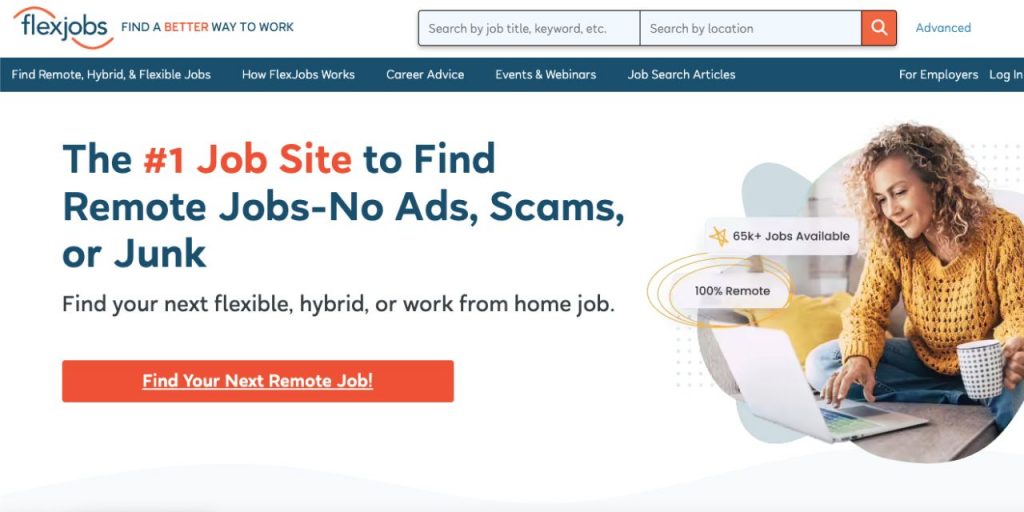
Flexjobs is a job site that was launched in 2007 and specializes in helping employers recruit remote talent. Unlike Qwick and OysterLink, Flexjobs caters to a wider range of industries. Their openings range from account management to software development.
Flexjobs job posting cost:
Flexjobs offers two pricing plans: one for employers and one for job seekers. For employers, the best value plan is $2,999 per year. For job seekers, they offer a promo price of $2.95 for 14 days, after which the cost increases.
Why it’s great for employers:
The membership subscription plan includes unlimited job posting and resume searches, along with Applicant Tracking System (ATS) integration. Nonprofit companies and B Corps receive a 50% rebate, provided they submit the necessary documentation.
Why it’s useful for job seekers:
Flexjobs manually screens all job postings from more than 6,000 companies to ensure they aren’t scams. It offers remote, hybrid job listings in over 50 roles, ranging from entry-level to executive positions. The platform also provides career advice on networking, management and negotiation skills
Pros
- Job seekers are assured that all jobs are screened for authenticity
- Excellent customer service for both employers and job seekers
Cons
- Job seekers need to pay to access the job listings
- Employer subscription plans are expensive
- Flexjob reviews suggest that many of the same features and resources are available for free from other competitors
- Similar to Qwick, Flexjobs isn’t ideal for those seeking full-time roles
3. Snagajob
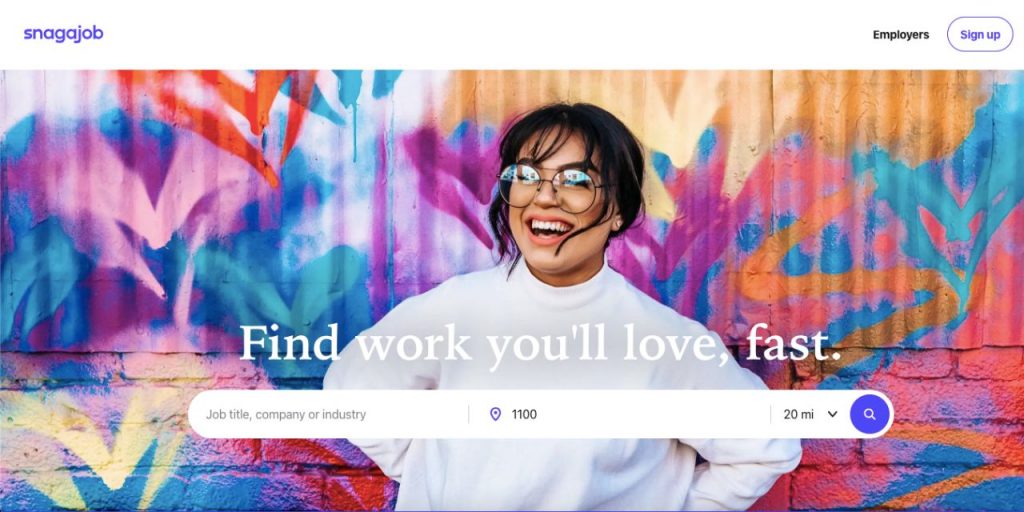
Similar to Qwick, Snagajob is a recruitment solution that specializes in hourly workers. However, it caters to multiple industries, including healthcare, retail, restaurant and education.
Snagajob job posting cost:
$89 per job post per month
Why it’s great for employers:
It offers flexible plans suited for both enterprises and small businesses. It also provides rich resources to help Hiring Managers find the best temporary workers, including a U.S. job market hiring report.
If you’re hiring for an urgent role, you can improve the visibility of your post by setting a daily boosting budget.
Why it’s useful for job seekers:
Since Snagajob was established in 1999, it has built a robust network of 700,000 employers, providing job seekers with many job opportunities.
The platform also provides career advice on applying for jobs and interviewing, along with a salary calculator to guide them through budgeting.
Pros:
- Beginner-friendly, allows you to filter jobs for teens
- Quick and easy account setup
- Offers extensive resources beneficial for both employers and job seekers
Cons:
- Can be expensive
- Not suitable for hiring executive-level roles
- If you’re looking for Qwick alternatives specifically targeting the hospitality sector, it might be challenging due to the wide range of industries Snagajob serves
4. RippleMatch
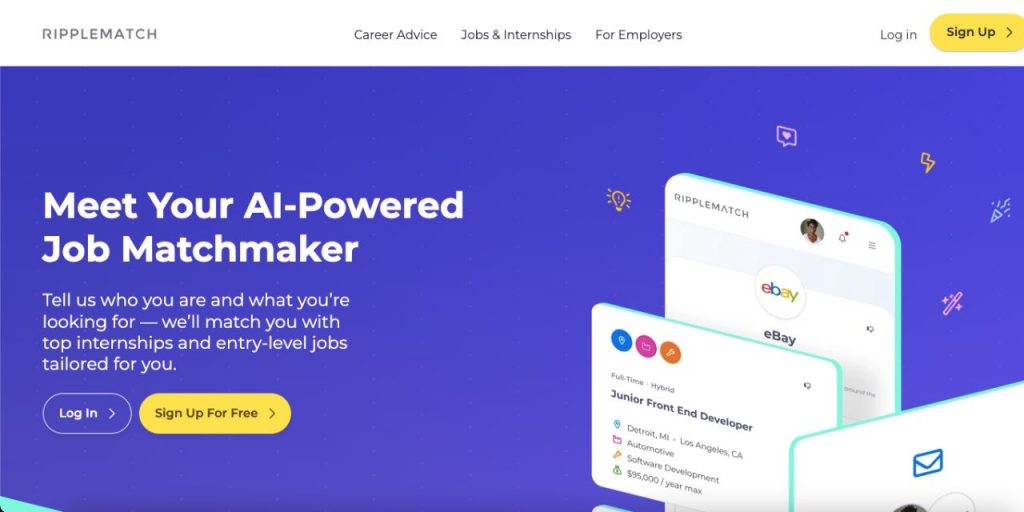
RippleMatch is a job matchmaker platform founded by former Yale students in 2016. It aims to provide employers with a more diverse pool of talent and help college students find jobs that match their skills, experiences and career plans. RippleMatch uses AI to scan all job seeker profiles created on the platform and match them with jobs posted by employers.
Ripplematch job posting cost:
For employers, using RippleMatch ranges from $30,000 to $250,000, depending on the features they choose.
Why it’s great for employers:
RippleMatch reduces the manual labor of sorting through hundreds of resumes for a single job posting. It also allows employers to set up their own events on the platform, connect with candidates personally and eventually convert them into hires. The platform also provides data on event attendees, including their profiles and insights on what types of events attract ideal hires.
Why it’s useful for job seekers:
The founders observed how their classmates were struggling to get interviews despite being qualified. Since RippleMatch uses AI and algorithms to recommend profiles to employers, job seekers benefit from the platform endorsing their resumes to potential employers. This increases their chances of securing interviews.
Pros
- Streamlines the hiring and job searching process by automating job matching
- Uses technology to screen candidate profiles, helping reduce bias in hiring decisions
- Helps employers create a talent pool through events
Cons
- The platform totally eliminates human involvement in the screening process, which might miss certain nuances in candidate profiles that make them a good fit
- RippleMatch is one of the most expensive job board platforms on this list
- Not suited for managerial-level roles
5. Talent.com
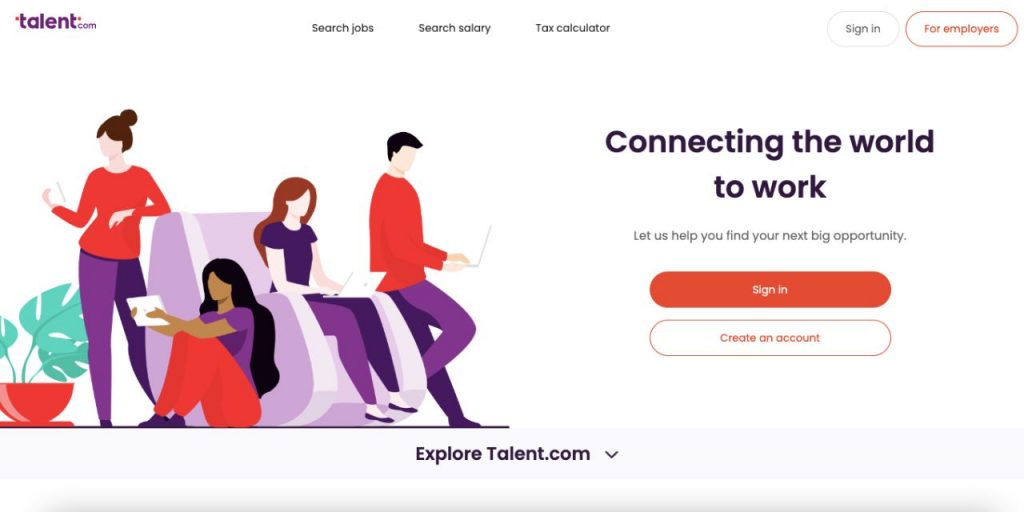
Talent.com is a job aggregator that collects job openings from company websites and other job boards, providing job seekers with numerous opportunities.
Talent.com job posting cost:
Posting a job is free, but you’ll likely need to boost it to stand out among other companies. To know the costs for boosting your job ad, contact Talent.com’s customer support directly for details.
Why it’s great for employers:
Talent.com’s global reach makes it an excellent platform for major hospitality conglomerates that operate in multiple countries, such as Marriott, Hilton and InterContinental Hotels Group, to access a wide range of job seekers across different locations.
Small, independent companies can also benefit from using Talent.com. Even if they use another job search platform to publish their job, it has a chance of also being featured on Talent.com, increasing their reach and visibility for free.
Why it’s useful for job seekers:
Since Talent.com is an aggregator, it’s the ideal platform for those who want access to all hospitality job listings in one place.
Talent.com also offers useful tools such as a salary converter and tax calculator, enabling job seekers to make informed decisions based on expected pay and local tax regulations.
Pros:
- Easy to use
- Free to post a job
- Has a global reach, with jobs available in more than 75 countries
Cons:
- Limited support and resources specifically for employers
- As an aggregator site, it doesn’t specialize in hospitality jobs
- High competition due to the volume of job postings available on the website
- Talent.com reviews are rated poorly by many job seekers, who state that there are plenty of fake job posts intended to sell personal information
6. Glassdoor
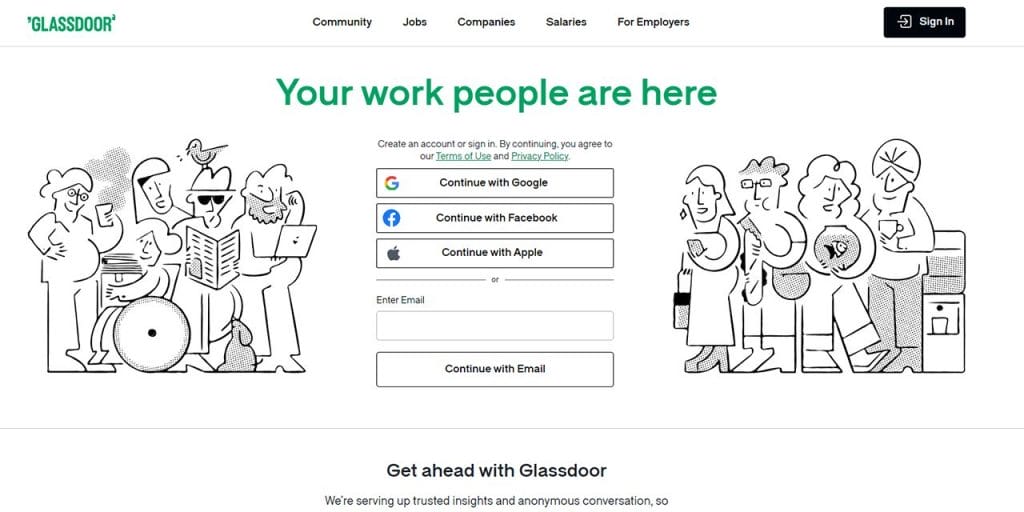
Glassdoor is a popular job search website best known for its company reviews. The platform advertises jobs across all industries.
Glassdoor job posting cost:
Costs aren’t publicly disclosed, but you’ll likely need to use sponsored ads to get your job ad to the top of the list since Glassdoor is partnered with Indeed and it operates on the same principle.
Why it’s great for employers:
Employers can use Glassdoor’s review page as an opportunity to showcase their company and highlight why it’s a great place to work. Glassdoor offers a paid Enhanced Employer Profile where you can promote positive reviews left by former and current employees.
According to surveys, 88% of job seekers say that an employer’s brand plays a significant role in deciding where to apply for a job. Demonstrating why your company is good is especially crucial in the hospitality industry, where the competition for quality candidates is tight.
Why it’s useful for job seekers:
Job seekers can use Glassdoor to make informed job-searching decisions. Beyond company reviews, Glassdoor salaries allow users to see salary insights for the same roles in different establishments. It also provides a wealth of resources, including job search tips, advice on salary and benefits negotiations and interview and resume guides.
Pros:
- Free to create an employer profile
- Offers a lot of support and resources to help employers stand out to job seekers
- Has a salary comparison feature that helps job seekers understand what professionals in similar careers at different companies are earning
Cons:
- Not exclusively focused on hospitality jobs
- Glassdoor reviews are anonymous, so they should be considered carefully and verified with other resources
- As an employer, maintaining a good reputation on Glassdoor requires active effort, including managing and responding to negative reviews
7. Indeed
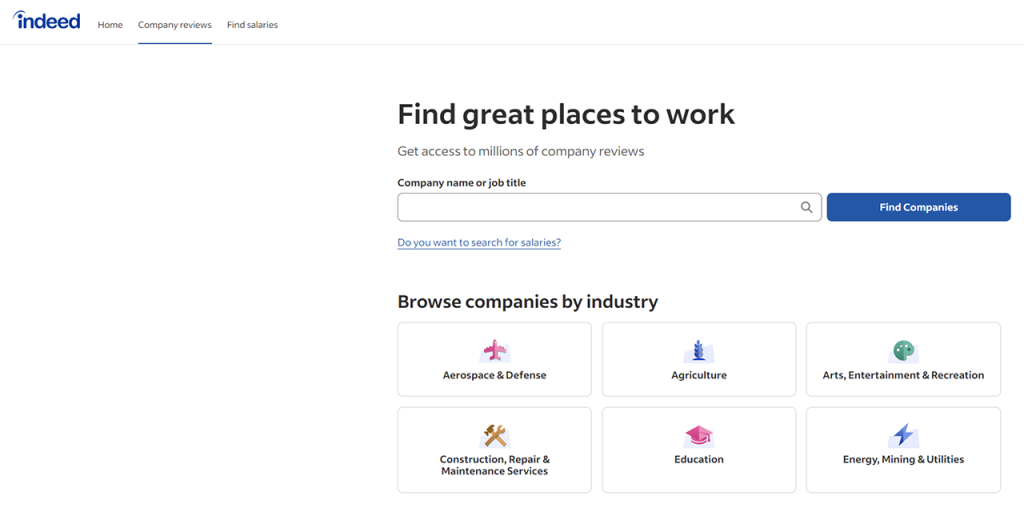
Indeed is a global job hiring website. The platform claims to have more than 350 million unique visitors per month, making it one of the go-to job boards for both employers and job seekers.
Indeed job posting cost:
Posting a job is free, but employers are encouraged to use sponsored ads starting at $5 per day to ensure their jobs stay visible among hundreds of listings on the platform.
Why it’s great for employers:
Indeed provides plenty of resources to help employers from all industries find the right candidates. This includes job description examples, interview questions and talent management tools to promote employee engagement.
Indeed also hosts industry events specifically for employers, tackling topics such as equity in hiring and featuring well-known personalities, with the most recent one being Trevor Noah gracing their event this September.
Finally, to help employers continuously improve their hiring strategies Indeed offers tools to track the performance of their ads.
Why it’s useful for job seekers:
Similar to Glassdoor, employees can rate their employers, giving job seekers a glimpse of what it’s like to be part of a potential employer’s team. This is a valuable source of information when considering different companies.
In addition, Indeed offers a resume builder, guides on how to ace interviews and suggestions on certifications that can help advance your career.
Pros:
- Plenty of resources for both employers and job seekers
- User-friendly
- Has a wide reach
Cons:
- While posting a job is free, employers often need to boost it due to the high volume of job ads posted every day; for job seekers, it can be hard to stand out among the many applications employers receive
- Indeed jobs aren’t specific to the hospitality industry
- Advanced features, such as Smart Sourcing for shortlisting candidates who match your job description, can be costly
8. LinkedIn

LinkedIn is a social media platform for the business community. Employers can create profiles, post jobs and share branded content to connect with professionals. LinkedIn is also used for professional development, as many companies offer both free and paid courses to help users learn and develop skills.
LinkedIn job posting cost:
Employers are encouraged to use promoted job posts to get more qualified applicants by appearing at the top of search results. They can set a total or daily budget depending on their financial plan. A job on LinkedIn can cost anywhere between $1,000 to $2,000 depending on the location, type of establishment, etc.
Why it’s great for employers:
LinkedIn gives employers access to a large pool of candidates. Employers can easily communicate with candidates by sending messages or inviting them to connect.
In addition, LinkedIn offers a variety of products to streamline the recruitment process, such as LinkedIn Recruiter, which allows employers to find candidates using more than 40 advanced search filters, including previous job titles, skills and locations.
Why it’s useful for job seekers:
LinkedIn functions like your resume on social media. It allows you to showcase your professional experiences, certifications and recommendations from previous colleagues, which can help you advance your career.
By optimizing your LinkedIn profile — including setting a cover photo, using a professional profile photo and incorporating relevant keywords in your titles, — Hiring Managers can easily find and reach out to you with job opportunities.
You can also use a badge on your profile photo to let employers know you’re open to work without them needing to open your account.
Pros:
- Employers can decide how much to pay to boost their job ads
- Offers customized products for companies hiring in large numbers or for a few positions
- Similar to Glassdoor, LinkedIn has a career page that employers can optimize to showcase their company culture and attract the right candidates
- Provides insights and analytics for job postings to assist Hiring Managers in improving their recruitment strategies
Cons:
- Only offers one free job post at a time
- High competition due to the large number of users
- Some of LinkedIn’s recruitment features can be expensive
- There’s a tendency to receive spam messages from people looking to connect, which can be time-consuming to manage
- Not focused on hospitality, making the job search process overwhelming for those in the industry
9. ZipRecruiter
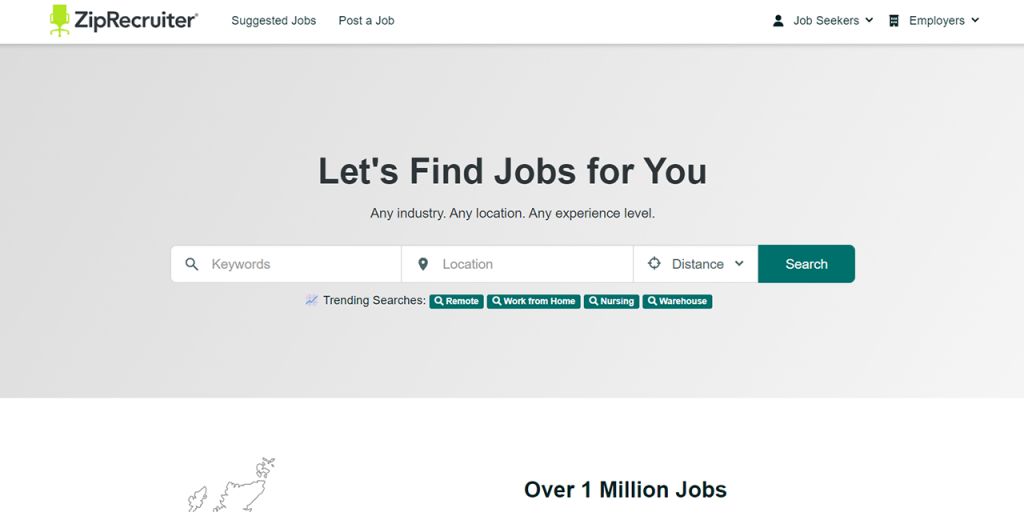
ZipRecruiter is a job posting website that caters to employers in the U.S. and Canada. It’s known for advertising openings across all industries and forwarding them to other job boards to increase reach.
ZipRecruiter job posting cost:
$24 per day
Why it’s great for employers:
ZipRecruiter offers efficiency by providing customizable job description templates and using candidate-matching technology to help filter candidates that match their requirements. This saves Hiring Managers time from writing job descriptions from scratch and manually sifting through resumes to make sure they find the ideal candidate.
Why it’s useful for job seekers:
Job seekers can create a ZipRecruiter account for free. The platform makes it easy for job seekers to browse through more than 15 million jobs from different industries using several filters such as company, title, city or work setup — whether remote, part-time or full-time.
ZipRecruiter also offers comprehensive salary insights to help job seekers negotiate offers within the market rate.
Pros:
- Mobile friendly, allowing employers to review candidates on the go and job seekers to browse jobs anytime, anywhere
- Strong customer support channels
Cons:
- Primarily caters to entry-level employees
- Covers all industries, making the job search process for hospitality roles a bit challenging
- Since ZipRecuiter forwards job posts to other job boards, employers have little control over where their job ads appear, which can lead to negative perceptions of their companies
10. Wellfound
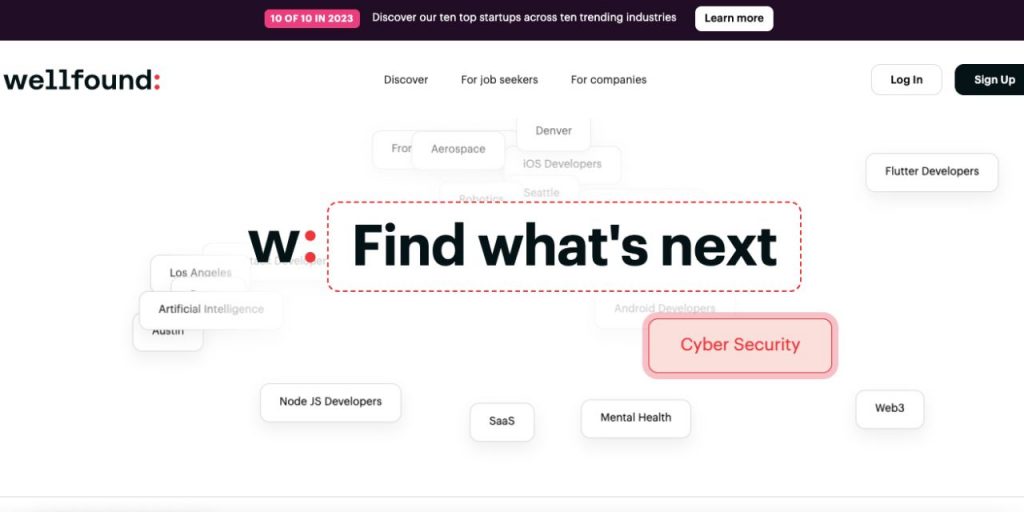
Formerly known as AngelList, Wellfound is a tech-focused job search platform established in 2013. The platform offers jobs in engineering, product, design, data and analytics.
Wellfound job posting cost:
It’s free to post a job but if you want advanced features such as screening questions to ensure applicants meet the basic qualifications, you need to pay $149 a month.
Why it’s great for employers:
Wellfound has a feature called RecruiterCloud that finds candidates with the same experience as specified in your job ad and checks if they’re interested in your job. When these two criteria are met, Wellfound will automatically schedule an interview with the applicant.
The platform also has one of the largest talent pools, with more than ten million job seekers using Wellfound to find jobs in various industries.
Why it’s useful for job seekers:
Wellfound offers convenient features for job seekers. For one, they don’t require a cover letter. To save time, it allows you to share your salary expectations upfront in case the employer’s budget doesn’t align.
Finally, it offers a Featured option, where you can apply to be endorsed directly to companies looking for your skills for free.
Pros:
- Comes with a basic ATS that streamlines the hiring process
- Free to post a job
Cons:
- Primarily focuses on startup companies, which may not be suitable for established hospitality conglomerates
- Has limited scope outside of the tech industry
- Advanced features are charged extra
Post a Job on OysterLink For Free Today
Posting a job on OysterLink is FREE and EASY. It only takes a minute to fill out a few details about your company, and your job ad will be visible to our network of top professionals in the events, food and beverage and hotel industries.
Access our extensive resources to guide you through your recruitment process, such as free downloadable job description templates to attract the right candidates.

Written by Rea Gierran
With a background in Communication Arts, Rea’s expertise lies in content marketing and copywriting. Her published works can be seen on online news websites such as Rappler and Adobo magazine. Outside of her work, Rea takes on the role of a “momager” for Shiro, a TikTok dogfluencer.

Reviewed by Stefan Petrov
With over 10 years of experience as a writer and editor, Stefan has worked in the automotive, IT, health and hospitality industries. Familiar with Google Search Console and other SEO tools like Ahrefs and Semrush, Stefan uses his experience to create content that’s visually appealing to the user but also ranks in the SERPs.
